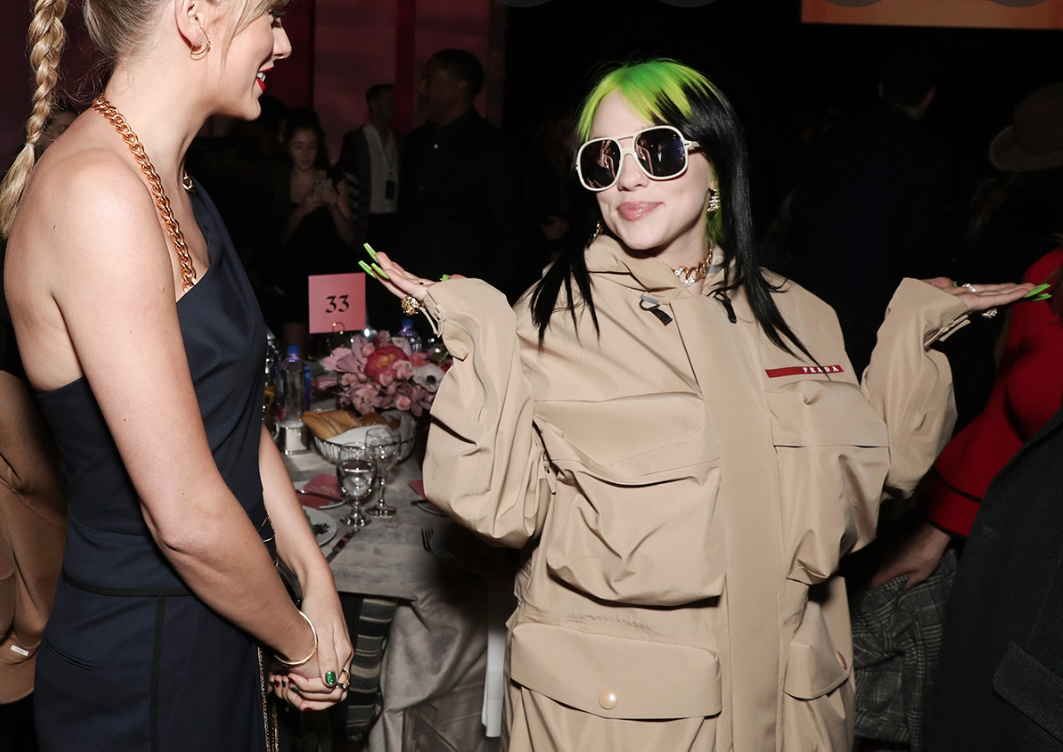Perhaps because it’s so unusual to encounter a Gen Zer doing anything either original or “first” (not that anything really can be at this point), listeners have been quick to forget that, earlier this year, Billie Eilish already immortalized the lyrics, “I’m the problem” on her single, “TV,” released in July via her two-track EP, Guitar Songs. While Taylor Swift may have already written “Anti-Hero” at that juncture, the rule goes that whoever releases something before another musician tends to be the “owner” of that lyrical phrase. And yet, Eilish, despite her equitable popularity to Swift in such a short span of time (although the two seem vastly different from a stylistic perspective, the singer-songwriter shtick is prominent in both), has largely been forgotten for helming, “I’m the problem.” That is, ever since “Anti-Hero” inaugurated the barrage of singles that will inevitably be released from Midnights.
Maybe the effortless forgetting of Eilish as the OG “responsibility-taker” for being something of a “problematic” person (in addition to a jobist) stems from how she couldn’t be bothered to note, “Maybe I, maybe I, maybe I’m the problem” in a catchy pop song format the way Taylor has with the chirpier phrase, “It’s me, hi/I’m the problem/It’s me.” Perhaps just going to show that the millennial knows best when it comes to toeing the line between pandering to the generations they’re sandwiched in between. Whereas Gen Z seemingly just wants to burn the whole world to the ground (but is ultimately too apathetic to do so). All while claiming to be “much different” from the millennials they balk at while simultaneously grafting pretty much every pop cultural element from them (except in this anomalous case of Taylor grafting from Billie, unless, of course, the former has documentation [obviously, she does] of the exact date she initially started writing “Anti-Hero”). And yet, not so “different” as to avoid “covert narcissism disguised as altruism,” as Taylor words it. In Eilish’s case, that comes in the form of asking hopefully, “Did you see me on TV?”
The lack of divergence from previous generations of women on Eilish’s part has also been frequently revealed by the “pull” of older men—all while putting out the contradictory message of being “weird” a.k.a. anti-heteronormative. Yet Eilish is perhaps even more heteronormative (which, ironically, “wish you were gay” also corroborates) than Swift if her history of fetishizing “mature” dick is any hint.
And yes, she continues to be “the problem” after dressing up as a baby for Halloween while her older boyfriend, Jesse Rutherford (best known as the lead singer of The Neighbourhood), opted to show up as an old man. Although the two might have thought it was a “cute” way to “poke fun” at their almost eleven-year age gap, it only highlighted how little Eilish actually cares to cater to her own easily outraged generation (in addition to highlighting the retroactive ick factor of one of The Neighbourhood’s biggest songs being called “Daddy Issues”). Something she also made apparent when she appeared on the cover of British Vogue in what amounted to Marilyn drag (and actually, Billie Eilish might have been a better choice for Marilyn in Blonde than Ana de Armas—granted, nothing and no one could have saved that monstrosity). This after building her “brand” on championing the “offbeat”—as Wednesday Addams might in the twenty-first century.
As for Taylor, the extent of her own “experimentation” comes in the form of sampling the “dream pop”/electropop stylings of the 2012 era that the likes of Chvrches, M83 and Phantogram already perfected. But, as Taylor has shown us in ousting Billie with the “I’m the problem” adage, she’s capable of “erasing” anyone she wants to whenever she comes along to perform something with her own musical interpretation of what’s already been done before. Plus, Eilish is more reluctant to admit her wrongdoings/overall frailty on “TV,” only gradually coming to the conclusion at the very end of the song that, “Baby, I, baby, I, baby, I’m the problem.” Taylor, in contrast, is far quicker to take the blame for, well, everything. Especially when it comes to being “too big to hang out” with (just as Lorde noted of herself on “Liability”). And while “TV” is a song that focuses more on the general “sickness of the culture,” “Anti-Hero” is about being overcome by one’s own insecurities and giving in completely to that low self-esteem.
Eilish, instead, appears to have low esteem for everyone else when she offers lyrics like, “The internet’s gone wild watching movie stars on trial/While they’re overturning Roe v. Wade.” However, one notable similarity regarding insecurity that is present on both tracks pertains to weight—apparently a subject that transcends all generational divides in spite of Gen Z’s frequent touting of “body positivity.” While Eilish sings, “I’ll try not to starve myself/Just because you’re mad at me,” Taylor (formerly) showed that insecurity with a scale in the “Anti-Hero” video that reads, “FAT” when she steps onto it. Except, of course, she wasn’t allowed to have her own feelings displayed for long because of the scandalized Gen Z types that would accuse her of being fat-shaming to others.
As for Eilish and her own problematic nature, she’ll take a less direct approach in confronting it, as manifest in the “TV” lyrics, “I’ll be in denial for at least a little while.” The same way Swifties will be about Eilish sonically coining “I’m the problem” before Taylor.






















[…] Genna Rivieccio Source link […]
[…] she did not do this because it would not ‘have been as profitable.’” Thus, perhaps as her on-again off-again foil, Billie Eilish, is known for touting, maybe Swift truly believes that, regarding some […]
[…] perhaps as her on-again off-again foil, Billie Eilish, is known for touting, maybe Swift truly believes that, regarding some […]